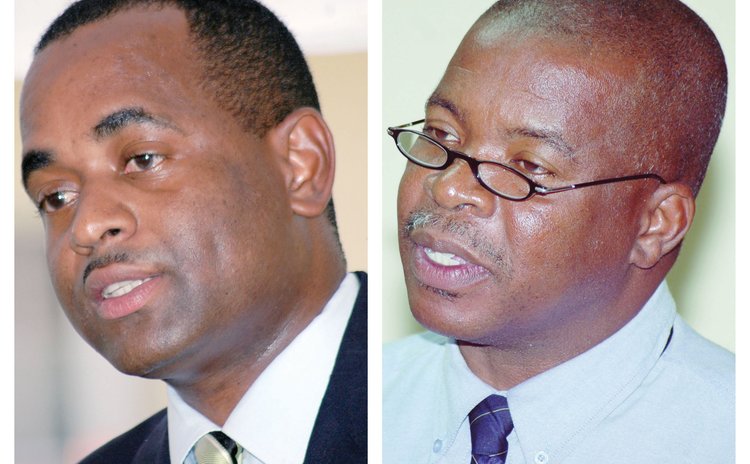Thanks, but no thanks
Government fails to act on Public Service Union offer to help after Erika

Thomas Letang can't believe it. It would seem all the talk about people coming together to help rebuild after Tropical Storm Erika, all the pleading with Dominicans, all the imploring, was nothing but empty cant.
If only he could climb into the Prime Minister's head and rationalize in a meaningful way what he has been trying to achieve in the wake of the devastation caused by Erika on August 27.
"To tell you the truth all I got was a letter acknowledging receipt of my letter and telling me they would follow up with me," a clearly disappointed Letang told The Sun.
This was in reference to a request from the Dominica Public Service Union (DPSU) to government to allow public servants one day every other week to work in their communities to assist with the rebuilding after the storm.
His comment was preceded by a slight, almost subconscious giggle when he was asked whether government had responded to the union's request. It wasn't clear whether it was from amusement or embarrassment.
The union's request was among a number of recommendations and offers in recognition "of the challenges the country faced" as a result of TS Erika.
Letang wrote to government on 5 October advising that the union's membership had met on 24 September and agreed to demonstrate their willingness to contribute to the reconstruction effort in a meaningful way.
"We told them . . . of the decision to forgo any salary increases and allowance for one year and for public officers to spend one day every fortnight to give their services," the union boss recalled in an interview with The Sun last week.
The union was preparing to hold a general meeting with its membership to cement its approach to the negotiations with government for a three-year agreement effective 1 July 2015 to 30 June 2018 when TS Erika unleashed its fury on Dominica, taking lives and disrupting even more lives.
In the 5 October letter to government Letang also raised concerns "about the pain and suffering" of the workers of the Public Works Corporation who have been laid off since 1 July after they protested over a number of issues, including late payment of salaries, the non-payment of Social Security contributions and benefits and "hazardous" conditions under which they were made to work. The PWC has said it has a cash flow problem.
"We ended [the letter] by saying our continued sacrifice will also hinge on government's good faith in dealing with these workers [and] we were willing to meet with government at a convenient date and time," Letang said.
On 6 October the union received a letter acknowledging receipt of its proposals and advising that "government's position will be communicated shortly".
"We have heard nothing from them since. Absolutely nothing," a bemused union boss exclaimed.
"We are disappointed. Here we think that our country was hit by a storm, you are asking people to make sacrifices and to be involved in the reconstruction process, and here we are the largest public service in the country and all we get is an acknowledgement.
"Here it is that we are offering something which could be a model, offering something meaningful . . . and we are saying in addition to all that we are willing to forgo any increases in salaries and allowances. It begs the question, how serious are we as a nation to get everybody on board to rebuild the country?
"We are very disappointed and we believe if this country was taking things seriously, we cannot just be there asking people to help us and we are not bringing people together to help."
Government has estimated that the storm caused $1.3 billion in damage, twice the national budget for 2015/2016. Funds and pledges were trickling in in the immediate aftermath, however this has come to a virtual halt.
At the same time, the reconstruction is proceeding "very, very slowly," according to Letang, who pointed to his home village, Pichelin, where running water is still an expensive dream, as an example.
With attention diverted to global hot spots and other disasters, the union boss has concluded that government has a tough job raising the funds needed to rebuild.
"It's going to be difficult to raise that [the money]. That is why what we do locally is very, very important; volunteerism is very important, which is why we are disappointed that the proposal by the union has been ignored," he concluded.
If only he could figure out what the Prime Minister is thinking!




